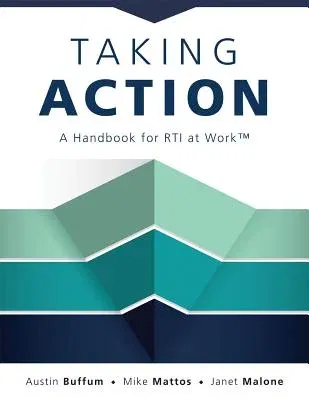Response to intervention (RTI) is the most effective process for
ensuring student success, using differentiated instruction to provide
the time and support necessary. This comprehensive implementation guide
covers every element required to build a successful RTI at Work(TM)
program in schools. The authors share step-by-step actions for
implementing the essential elements, instructional strategies, and tools
needed to support implementation, as well as tips for engaging and
supporting educators. Readers who valued the practical knowledge in
Learning by Doing: A Handbook for Professional Learning Communities at
Work(TM) (DuFour, DuFour, Eaker, Many, and Mattos) will appreciate a
similar style and practicality in Taking Action.
This guide will help you incorporate the response to intervention
process by allowing you to:
-
Understand how RTI at Work(TM) builds on the PLC at Work(TM) process.
-
Response to intervention or RTI (also known as multi-tiered system of
supports or MTSS) is the most effective process for ensuring student
success, using differentiated instruction to provide the time and
support necessary. This comprehensive implementation guide covers
every element required to build a successful RTI at Work(TM) system of
support in schools. The authors share step-by-step actions for
implementing the essential elements, instructional strategies, and
tools needed to support implementation, as well as tips for engaging
and supporting educators. Readers who valued the practical knowledge
in Learning by Doing: A Handbook for Professional Learning
Communities at Work(TM) (DuFour, DuFour, Eaker, Many, and Mattos)
will appreciate a similar style and practicality in Taking Action.
This guide will help you incorporate the response to intervention
process by allowing you to:
- Understand how RTI at Work(TM) builds on the PLC at Work(TM)
process.
- Review the revised RTI at Work(TM) pyramid and its three RTI tiers.
- Learn what roles teacher teams, leadership teams, and schoolwide
teams play in a multi-tiered intervention structure.
- Understand the differences among intervention, extension,
prevention, and enrichment.
- Avoid common missteps when implementing RTI (or MTSS).
- Consider why an achievement gap remains in 21st century education
and how the RTI process can close that gap.
Contents:
Introduction
Chapter 1: The RTI at Work(TM) Pyramid
Chapter 2: A Culture of Collective Responsibility
Part One: Tier 1 Essential Actions
Chapter 3: Tier 1 Teacher Team Essential Actions
Chapter 4: Tier 1 Schoolwide Essential Actions
Part Two: Tier 2 Essential Actions
Chapter 5: Tier 2 Teacher Team Essential Actions
Chapter 6: Tier 2 Schoolwide Essential Actions
Part Three: Tier 3 Essential Actions
Chapter 7: Tier 3 Schoolwide Essential Actions
Chapter 8: Tier 3 Intervention Team Essential Actions
Epilogue
References and Resources
Review the revised RTI at Work(TM) pyramid and its three RTI tiers.
-
Learn what roles teacher teams, leadership teams, and schoolwide teams
play in a tiered intervention structure.
-
Understand the differences among intervention, extension, prevention,
and enrichment.
-
Avoid common missteps when implementing RTI.
-
Consider why an achievement gap remains in 21st century education and
how the RTI process can close that gap.
Contents:
Introduction
Chapter 1: The RTI at Work(TM) Pyramid
Chapter 2: A Culture of Collective Responsibility
Part One: Tier 1 Essential Actions
Chapter 3: Tier 1 Teacher Team Essential Actions
Chapter 4: Tier 1 Schoolwide Essential Actions
Part Two: Tier 2 Essential Actions
Chapter 5: Tier 2 Teacher Team Essential Actions
Chapter 6: Tier 2 Schoolwide Essential Actions
Part Three: Tier 3 Essential Actions
Chapter 7: Tier 3 Schoolwide Essential Actions
Chapter 8: Tier 3 Intervention Team Essential Actions
Epilogue
References and Resources

